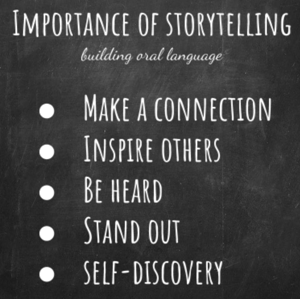July 2019 | Super Writing Lessons | Narrative | Quick Tips | Grades 2-5 | Vocabulary | Writing Across the Curriculum | Middle Grade | State Standards | Oral Language | Standards Alignment
NEW ELAR TEKS- Building Oral Language
Read Time 3 mins | July 26, 2019 | Written by: Kylene Reed
 When I first began teaching, I was in a first-grade classroom at a district that was a big advocate for balanced literacy. As an inexperienced first-year teacher, I was fortunate that I had an amazing literacy coach who walked me through the process of incorporating balanced literacy in my classroom. I remember well, spending a lot of time storytelling with my students before they ever began to write their own stories. I would model by telling a story to them, and then each day a couple of students would get to sit in the presentation chair and tell their stories. This made perfect sense to me at the time, because first graders are still developing their vocabulary and learning how to speak properly.
When I first began teaching, I was in a first-grade classroom at a district that was a big advocate for balanced literacy. As an inexperienced first-year teacher, I was fortunate that I had an amazing literacy coach who walked me through the process of incorporating balanced literacy in my classroom. I remember well, spending a lot of time storytelling with my students before they ever began to write their own stories. I would model by telling a story to them, and then each day a couple of students would get to sit in the presentation chair and tell their stories. This made perfect sense to me at the time, because first graders are still developing their vocabulary and learning how to speak properly.
Fast forward 17 years... and here I am a couple of weeks ago, sitting in a presentation at a conference in Philly for a rare kidney disease that my oldest son has. The presenter pulls up her PowerPoint, and the first slide is about storytelling. Now the purpose of her presentation was for families like mine to learn to speak out and tell our story about Cystinosis. There are less than 500 cases of this disease in the US, and 2,000 worldwide. So as you can imagine, there is a need for these few families to speak out and help spread the word of our organization to doctors and other families that are newly diagnosed. As my husband and I sat at our table, I began to take notes on everything that she was saying, and it hit me that I wanted to use it in my classroom too!
Over the years of teaching older students, I lost sight of the importance of telling a story. I forgot that even my sixth graders are still growing their vocabulary and learning how to speak properly. So right there in the middle of the conference, my mind ran wild with lesson ideas that would have my students begin telling stories again.
One of my favorite things that was said during the presentation was this, "Storytelling is a journey of self-discovery. The more you tell a story, the more authentic it becomes." This really stuck with me, and I will be making a poster of it for sure!)
As the talk went on she covered a few guidelines for telling a story:
1. Set an appropriate amount of time depending on the audience and purpose
2. Create an outline not a script
3. Ask yourself, What is the bottom line? Who and I speaking to? What is the point you want to get across to the listener?
4. Be yourself and be confident
AND we can't forget the practice component! Use a timer, video yourself, and ask for feedback from friends and family. These are all guidelines and strategies that I think would help my students in being successful and feeling more prepared to tell a story in class.
So How Am I Going To Use This Idea?? Our ELAR teks in Texas focus on the student developing oral language through listening, speaking, and discussion. Absolutely, I am going to use this with the narrative stories that the students develop, but I wanted to think outside the box and apply this same strategy to their informational pieces too.
-I am going to have my students tell their informational essay like a speech and use the Empowering Writers' pillar as their outline. Instead of having my students write the essay in its entirety, they will create and develop the framework and then practice telling their piece out loud. This will help them in speaking with organization, include elaborated details, and add in appropriate vocabulary and transitions throughout.
-Upon completion of their presentation, I will allow the student to take a number of questions from the audience. (students who have questions to ask after listening to the piece.)
- Through the practice of storytelling their paper, I believe my students will be able to really focus on the salient skills of the genre in which their paper is intended. They will be able to hear the message that they are wanting to get across and make sure that it entails all they want to say. Too often, my students' papers are lacking the necessary details to actually get a point across to anyone reading, and they don't notice how weak it is by just reading it silently to themselves. I am hoping that by practicing orally, they will not only become more confident speakers, but that their actual writing will become more authentic as well.
Can't wait to hear from you all. Let me know if you give this a try by sharing on my Facebook group- Love to Write and Read All Day!
